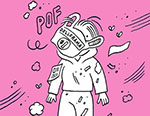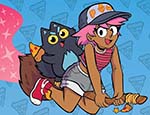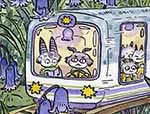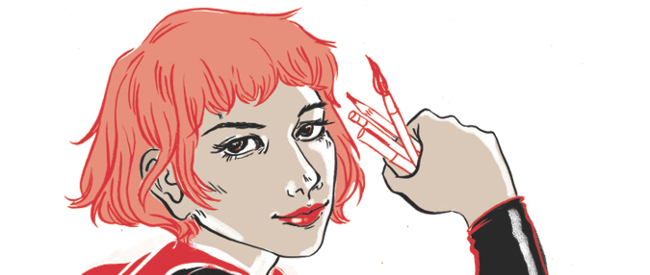
“Women have come so far in the comics community in spite of the harassment and discrimination they have faced, which I think sends a very powerful message to viewers.” – Marisa Stotter
For years, the state of women in comics has seemed like a perpetually wobbling set of scales, with every success story coming up against any number of anecdotes of harassment, discrimination, or worse. Phrases like “GamerGate” and “Fake Geek Girls” evoke deep-seated conflicts that can be difficult to comprehend and even deeper to overcome.
In such a climate, it would be easy for Marisa Stotter’s new documentary She Makes Comics (Sequart/Respect! Films) to be a litany of tragedy – but the director had something different in mind.
“I wanted the film to have a positive message and to be inspiring rather than distressing,” Stotter told Broken Frontier. “I decided that the best way to do this would be to make a documentary celebrating the contributions women have made to comics.”
Stotter pitched the film to co-producers Patrick Meaney and Jordan Rennert, who she met while working on the pair’s documentary on Image Comics, The Image Revolution. “The angle we took is that women have come so far in the comics community in spite of the harassment and discrimination they have faced, which I think sends a very powerful message to viewers.”
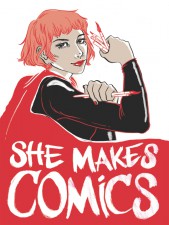 The results make a strong case for being “required viewing” for any fan of the medium. That’s because the story of women in comics is also the story of comics’ development as a whole, often being pushed in bold and exciting new directions by individuals who refused to be shut out.
The results make a strong case for being “required viewing” for any fan of the medium. That’s because the story of women in comics is also the story of comics’ development as a whole, often being pushed in bold and exciting new directions by individuals who refused to be shut out.
For much of its 70-minute duration, She Makes Comics lets the people who have lived it do the talking. The lean running time only makes the variety of contributors that much more impressive. Some of the names featured will be recognizable to many who are aware of industry history, including Jenette Kahn, former DC Comics president; Karen Berger, founding editor of DC’s Vertigo imprint; and Kelly Sue DeConnick, known best for revitalizing the character of Carol Danvers (and whose hard-hitting Bitch Planet recently blew us away at Broken Frontier).
Of course, one of the biggest joys of the film is getting a more intimate understanding of influential women who’ve never had the chance to describe their reality to a larger audience, and these run the gamut from the earliest days of comics to today. The film opens with an appreciation of Jackie Ormes, the first African-American female newspaper cartoonist in the 1930s, and covers most of comic history up to the present day.
Silver Age artist Ramona Fradon, prolific writer, artist, and podcaster Kate Leth, and underground comics pioneer Joyce Farmer are just a few of the other voices who add their unique perspective to She Makes Comics. Stotter also expands the conception of female contributions to comics through discussions with historian Trina Robbins, cosplay troupe Team Unicorn, and journalist/Friends of Lulu co-founder Heidi McDonald.
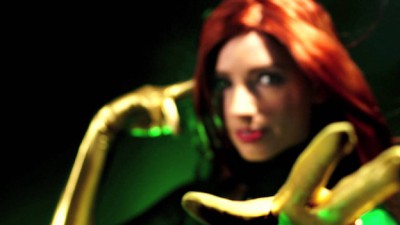 There are also appearances by some prominent male creators, such as Paul Levitz and Chris Claremont. For the most part, the film focuses on creators and broad trends over specific groundbreaking works. Claremont’s run on X-Men does get special mention, though, both for his uniquely collaborative working relationship with editors Louise Simonson and Ann Nocenti and for the lasting resonance of this best-selling work with female readers. The quote featured in this review’s title comes from comics journalist Jenna Busch, offering a fitting summary of why so many readers from different backgrounds found themselves attracted to the X-Men’s diverse cast.
There are also appearances by some prominent male creators, such as Paul Levitz and Chris Claremont. For the most part, the film focuses on creators and broad trends over specific groundbreaking works. Claremont’s run on X-Men does get special mention, though, both for his uniquely collaborative working relationship with editors Louise Simonson and Ann Nocenti and for the lasting resonance of this best-selling work with female readers. The quote featured in this review’s title comes from comics journalist Jenna Busch, offering a fitting summary of why so many readers from different backgrounds found themselves attracted to the X-Men’s diverse cast.
One of the most interesting messages of the film is the role the Internet has played in welcoming female readers as a channel for sharing fan art and fanfiction, self-publishing, or simply connecting with others who share their interests.
Of course, the Internet also serves as the breeding ground for many of the hostilities faced by female fans of all types. This is where geeks of all genders can help, says Stotter. “Standing by and staying ‘neutral’ makes you complicit in allowing this behavior to continue. I think we’ve reached a point where we are obligated to set an example for our peers by doing better and correcting the ‘bad’ behavior that we witness.”
More comment moderation on geek-centric sites and calls for better anti-harassment policies on social media are a great start, Stotter says. However, changing the behavior itself is the goal: “It’s like a positive form of peer pressure – if enough members of the community set good examples for one another, the less appealing it will be to say sexist and misogynistic things.”
Ultimately, She Makes Comics is a thrilling document of the diverse accomplishments of an incredible group of creators – many of whom just happen to be women.
That means there’s still room to expand on many of the topics the film touches on, especially when it comes to the role of non-Western media in bringing new readers into the fold. “It’s definitely something we’ve thought about, since the influence of manga and anime on Western comics is undeniable and an important part of comics history,” said Stotter. “I will say that we are exploring that for future projects, so stay tuned for more!”
She Makes Comics is available as a DVD or download (with or without matching T-shirt) from the Sequart Organisation.










